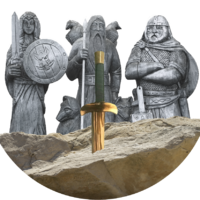 |
Fictional Ideology "This was made in the context of fiction, and it would make no sense in the real world." - Daniel Günther Thought This page represents a fictional ideology created as part of an alternate scenario by JonahF2014. |
Götzenism is a fictional ideology generated by a text-based political & nation simulation AI game. They represent the smallest political party in the ![]() Republic of Hamburg with only 6 members.
Republic of Hamburg with only 6 members.
They believe in a ![]() pagan revivalist story told by
pagan revivalist story told by ![]() their leader who claims that the
their leader who claims that the ![]() Germanic gods will return to destroy
Germanic gods will return to destroy ![]() Denmark.
Denmark.
Contents:
History
A political party named the "Götzenists" was founded by the ![]() self-proclaimed oracle Friedrich Wilhelm Nietzsche in 1844 after his disillusionment with the popular Hamburgian
self-proclaimed oracle Friedrich Wilhelm Nietzsche in 1844 after his disillusionment with the popular Hamburgian ![]() radical democratic movement caused by mental illness, which made him turn against modern society and adopt religious ideas.
radical democratic movement caused by mental illness, which made him turn against modern society and adopt religious ideas.
The Götzenists had only 6 members, being by far the smallest political party in Hamburg. In the 1844 election they received only 17 votes but, though vote splitting in a insanely small area, won one electoral district (by a single vote) which granted them a single seat in parliament. Friedrich Nietzsche joined the Hamburgian parliament as the sole representative of the party, to the great dismay of other representatives and parties, who despised his party's views.
In 1847 the Götzenists founded their own newspaper, "Götzenistischer Nachrichten" with an active readership of around 500 citizen. A more radical wing of the newspaper department split to form their own paper, "Götzenistischer Arbeiter", a paper of even more radical Götzenist views as well as a ![]() moderate pro-worker sentiment. Götzenistischer Arbeiter had a peak readership of 50.
moderate pro-worker sentiment. Götzenistischer Arbeiter had a peak readership of 50.
Paganische Zeitung is another newspaper in Hamburg, while it doesn't promote Götzenist ideas, it does promote Paganism and thusly creates some overlap between the pagan population (ca. 1% of Hamburg in 1847) and Götzenists.
In the 1848 election the Götzenists were able to achieve 35,000 votes by pandering to poor voters and preaching a ![]() pacifist sentiment. They won 2 districts and 4 seats.
pacifist sentiment. They won 2 districts and 4 seats.
Beliefs
Götzenists strive for a ![]() pagan revival and believe in the
pagan revival and believe in the ![]() ancient Germanic gods. These gods (specifically Thor, Odin and Freya), they claim, will return "from the sea" to defeat and destroy
ancient Germanic gods. These gods (specifically Thor, Odin and Freya), they claim, will return "from the sea" to defeat and destroy ![]() Denmark. This belief comes from the geopolitical situation Hamburg found itself in at the time - having only recently declared independence from the Danish realm, most of Hamburg's population was afraid of Danish
Denmark. This belief comes from the geopolitical situation Hamburg found itself in at the time - having only recently declared independence from the Danish realm, most of Hamburg's population was afraid of Danish ![]() revanchism. Added to this came great anti-Danish sentiment in the regions of northern Germany and Scandinavia, shared by both the polities and their populations; war seemed imminent at any time but has yet to actually come.
revanchism. Added to this came great anti-Danish sentiment in the regions of northern Germany and Scandinavia, shared by both the polities and their populations; war seemed imminent at any time but has yet to actually come.
Götzenists want to reestablish ![]() old Germanic tribal structures in all of Germany and oppose any technology invented during the ongoing industrial revolution. They see their leader, Friedrich Nietzsche, as the oracle who has a connection to the gods and can bring fourth prophesy.
old Germanic tribal structures in all of Germany and oppose any technology invented during the ongoing industrial revolution. They see their leader, Friedrich Nietzsche, as the oracle who has a connection to the gods and can bring fourth prophesy.
Götzenists are typically racist against Danish people.
How to Draw

- Draw a ball with a black outline.
- Fill with dark red
- Draw a wooden sword stuck into a boulder
- Behind the boulder, draw Thor, Odin and Freya in gray
- Add the eyes.
- Done!
Further Reading
| | |
| | |
| Self-Inserts | |
|---|---|
| | |
| Opposite Unity | |
|---|---|
| Off-Compass | |
| Non-Quadrant | |
| Fictional | |
| Self-Inserts | |